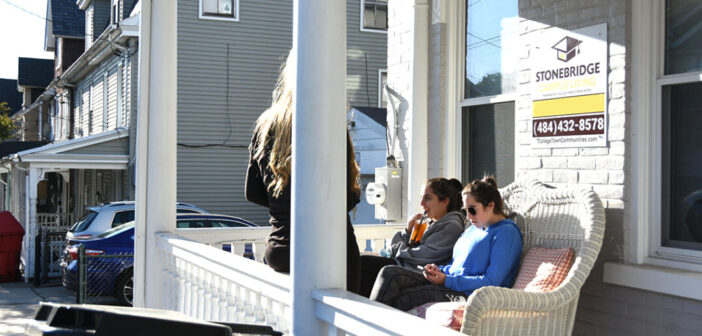Bethlehem City Council is looking at taking action against what it sees as a creeping of Lehigh student housing on the South Side into neighborhoods that have been primarily owner-occupied units.
The city wants to be more proactive about where regulated rental and student housing would take place, said Darlene Heller, Bethlehem’s director of planning and zoning.
A new zoning ordinance proposed at Bethlehem’s Sept. 1 council meeting would restrict student housing landlords to certain zones in which they can rent housing to Lehigh students. The ordinance has not yet been passed.
Heller said the new zones still offer a lot of room for expansion, so the city didn’t feel the ordinance was prohibiting student housing in a negative way.
James Byszewski, managing partner at Fifth Street Capital Partners, which owns several dozen student rental properties in South Bethlehem, said he is concerned about the ordinance. He argued it attempts to segregate where people are allowed to live based on their age and educational status. He said the ordinance would likely be argued as a violation of civil rights and fair housing laws.
“Regardless of the statutory and case law, it doesn’t seem like the right thing to do considering the conversations going on in our country lately,” Byszewski said. “I don’t understand why the city would be willing to go there right now.”
Byszewski also is concerned about how difficult it will be to enforce the ordinance, since it relies on the gathering of private and personal academic records of their tenants.
Sebastian Steel, ‘23, has the same concern with the ordinance.
“It is discrimination against students, is what it is,” Steel said.
Steel, from California, lives on Hillside Avenue on the South Side. His neighbors are not Lehigh students, and he barely talks to or sees them, he said. However, he said there are a good number of students living around him, which would fall in an area outside the zones proposed in the ordinance for student rental housing.
Steel is just one of many students who was planning on living on-campus this semester, but was forced to scramble and find housing elsewhere when Lehigh announced their plans for the fall semester.
Byszewski believes the timing of the ordinance is counterproductive to students like Steel. If the ordinance is passed now, it will cause many houses which are not typically occupied by students to be redefined as “student houses,” he said.
Heller explained this provision was put in place to protect the property owners who are providing student housing and are complying with the current ordinances.
“If the goal is to minimize the number of student houses outside of the zone, this school year is the worst time to draw that line in the sand,” Byszewski said.
Heller, however, said the market takes care of itself. In future years, the houses students currently live in due to Lehigh’s COVID response may not continue to be desirable student housing. The property owners won’t leave their units vacant and will find other non-students to live there.
“We don’t really know for sure, because I’ve never lived through a pandemic anyway, but it’s probably a blip,” Heller said.
Heller said city council has met with the Southside Housing Committee, which is in favor of the student rental restrictions, and also held meetings with landlords who have multiple student housing units. The Department of Community and Economic Development met with both parties involved, landlords and the Southside Housing Committee, with the goal of combining their issues and concerns into one document.
“While we, and other property owners, are not in support of this ordinance as it is currently proposed, we are optimistic that we can continue to work with city council, the administration and other stakeholders to craft a thoughtful solution that is fair, effective and enforceable,” Byszewski said.
The current draft of the ordinance is a compromise, but we may still have a long way to go in the arduous process of adopting zoning amendments, Heller said.
“Hopefully, we end up with something that is comfortable for most parties,” Heller said. “It is sometimes hard to do that, but of course, it’s the goal.”






Comment policy
Comments posted to The Brown and White website are reviewed by a moderator before being approved. Incendiary speech or harassing language, including comments targeted at individuals, may be deemed unacceptable and not published. Spam and other soliciting will also be declined.
The Brown and White also reserves the right to not publish entirely anonymous comments.